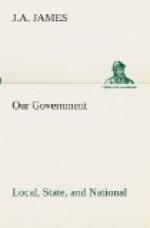PART II.
V. Events leading to
the formation of the union
VI. The constitutional convention
VII. Organization of the legislative department
VIII. Powers and duties of the separate houses
IX. How laws are made by congress
X. Some important powers of congress
XI. Other general powers of congress
XII. Powers denied the united states and
the several states
XIII. The executive department
XIV. Powers and duties of the president
XV. The cabinet
XVI. The national judiciary
XVII. Territories and public lands
XVIII. Amendments to the constitution
XIX. The governments of the world
Appendix.
A. Constitution of the united
states
B. The articles of confederation
C. Reference books
INDEX
PART I.
Local governments.
CHAPTER I.
THE WORK OF LOCAL GOVERNMENT.
The Preservation of Order.—The first and most important work of any government is the preservation of order. We think of this function most frequently as exercised in the arrest of offenders who violate the law. In fact, most young persons receive their earliest ideas of government by seeing the policeman, or constable, who stands for the authority of the government. But he is not the only officer who is concerned in preserving order. The police officer who makes an arrest cannot punish his prisoner, but must merely hold him until it is decided that he deserves punishment. This is the work of a court, with its justice, or judge, and the jury. If the prisoner is declared guilty, then the police officer executes the orders of the court by collecting a fine or by imprisoning him. We have here illustrated two divisions of governmental authority: (1) the judicial, which decides whether the law applies in particular cases; and (2) the executive, which carries out the requirements of the law and the orders of the court.
Law-Making.—The executive and the judicial officers are both subject to higher authority: the one applies and the other executes the law. The framing of the law is the third function of government. This work is called legislation, and is carried on by such bodies as the town board, the village board, and the city council. But these law-making bodies do not have independent authority; they are bound more or less strictly by the opinions of those who elected them to office; i.e., the body of voters.
The Three Divisions of Government.—We say, then, that in our country government is based finally upon the will of the people. For the expression of their will they choose numerous officers, who may be grouped under three heads, corresponding to the general divisions of government: legislative, executive, and judicial.




